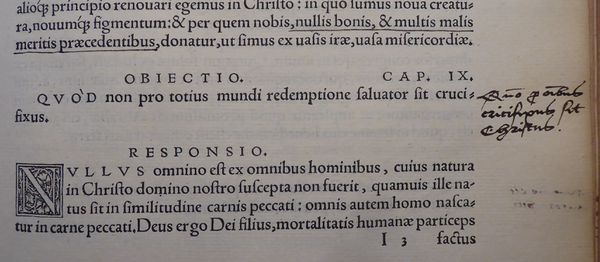Thomas Cranmer 1489-1556
Thomas CRANMER 1489-1556
Biographical Note
Born at Aslockton, Nottinghamshire, son of Thomas Cranmer, a member of a minor gentry family. BA Jesus College, Cambridge 1511, MA 1515, DD 1526; he was ordained by 1520, when he was licensed to preach by the University. He undertook some diplomatic work on Spain in the mid-1520s and came to prominence a few years later as a proponent of Henry VIII's annulment from Katherine of Aragon, with ideas as to how to achieve it. He received various ecclesiastical preferments while also being sent to Rome to argue the King's cause; in 1533 he was made Archbishop of Canterbury and he was thereafter at the centre of the political and spiritual upheavals of the following decades, through the establishment of the King as head of the Church, the dissolution of the monasteries, and the creation of a protestant Church. His position was often not an easy one but his sympathies always remained with reformist ideas. During the reign of Edward VI he supported efforts to confirm those policies, and he was the driving force behind the compilation and issue of the first Book of Common Prayer in 1549. When Mary came to the throne in 1553 he was arrested and imprisoned, and executed for heresy in 1556. He was, therefore, a hugely prominent figure in British political and ecclesiastical affairs during the middle decades of the century.
Books
Cranmer acquired books throughout his life, and he assembled one of the largest private libraries in Britain of his time. There are no contemporary inventories or catalogues and the full size of the library is not known; ca.700 books survive today (of which ca.70 are manuscripts, the rest printed), but some of his books may have been destroyed in the 1550s, and have certainly been lost since. His library, along with the rest of his goods, was confiscated when he was imprisoned, and much of it was acquired by Henry Fitzalan, 12th Earl of Arundel; after his death in 1579 it passed to his son in law John, Lord Lumley (1534-1609) and then to Henry, Prince of Wales. After his death in 1612 the books were absorbed into the Royal Library, and became part of the Old Royal Library collection which was donated to the British Museum in 1757. These books are therefore now in the British Library, where about 90% of the known books from Cranmer's library are now to be found, but dispersals took place over the centuries, and Cranmer books are now scattered across libraries around the world.
Of the surviving books, well over half are theological, but a wide range of other subjects are covered, including philosophy, law, geography, history and astronomy. Most are in Latin, with some books in Greek, Hebrew, French, Italian and English. The great majority were printed in continental Europe. A detailed analysis, and full catalogue of the surviving books, will be found in David Selwyn's book (see below). Most of the library is thought to have been kept at Cranmer's palace at Croydon during his lifetime, but some books were kept in other places.
Characteristic Markings
Cranmer's books are usually most immediately recognised from the inscription "Thomas Cantuarien[sis]" which was systematically added to the titlepages towards the end of his lifetime, by a secretary (the hand is not Cranmer's). Some books were annotated by him, including textual underlining. Around 90% of the known books also carry Lumley's inscription. Many books were rebound for Henry, Prince of Wales when they were in his custody (ca.200 examples are known, mostly in the British Library).
Sources
- MacCulloch, Diarmaid. "Cranmer, Thomas (1489–1556), archbishop of Canterbury." Oxford Dictionary of National Biography.
- MacCulloch, Diarmaid, Thomas Cranmer: a life, New Haven, 1996.
- Riser, E. S., Thomas Cranmer, in W. Baker and K. Womack (eds), Pre nineteenth-century British book collectors and bibliographers, Detroit, 1999, 70-77.
- Selwyn, David G., The library of Thomas Cranmer, Oxford, 1996.
- David G. Selwyn, The library of Thomas Cranmer: a supplement, Oxford Bibliographical Society.
- Selwyn, David G., Books with manuscript: the case of Thomas Cranmer's library, eBLJ 1997.
- Lambeth Palace Library Research Guide - Thomas Cranmer.

